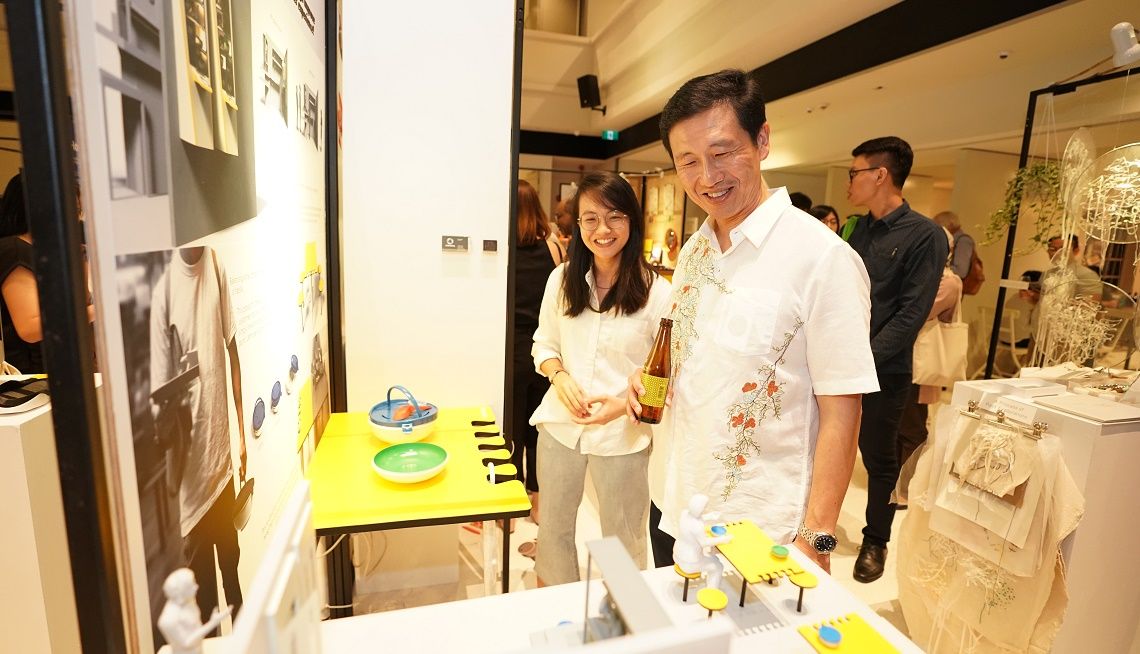Exclusive: How will Singapore survive growing inequality?
By Nurfilzah Rohaidi
Interview with Ong Ye Kung, Minister for Education, Singapore.

Singapore's former Education Minister Ong Ye Kung at NTU’s School of Art, Design and Media graduating showcase by NTU Singapore.
The concept of resilience resonates deeply with Minister Ong, who believes that it boils down to “character and a state of mind”. As disruption contributes to widen income gaps across the world, he believes this quality can help Singaporeans to stay united and prosperous.
In an exclusive interview with GovInsider, the Minister shares his views on how he hopes to build resilience in citizens - and the answer lies in skills and education.
Facing uncertainty
The challenge is to instil these values in the next generation. “A new generation is coming of age,” Minister Ong says. “They have not gone through the same hardships as their parents’ or grandparents’ generations, but that does not mean they will not be resilient.”
In the most basic sense of the word, resilience means being able to bounce back from adversity and become all the stronger for it. As jobs come under threat,Ong wants to support people in an uncertain world through education and skills-based training.
However, while some may think that it means studying a broad range of different skills, the Minister points out that they actually run the risk of becoming “a master of none” and ironically becoming the most susceptible to disruption.
“I believe that to cope with disruption, we need to act counter-intuitively, by going very deep in an area and developing mastery. This way, you cannot be easily replaced by machines,” he says.
“I believe that to cope with disruption, we need to act counter-intuitively, by going very deep in an area and developing mastery.”The government has introduced the SkillsFuture movement to help Singaporeans to reskill and upskill, and embrace the fact that there are numerous pathways to success. “This includes an initiative called SkillsFuture for Digital Workplace, which helps workers adapt to a data- and technology-rich workplace environment,” the Minister explains. Digital literacy is now just as important as language literacy, he says.
The education ministry has also converted all Polytechnics and Universities into lifelong learning centres. They will not only educate young students, but also train adult learners, he continues.
And while skills in demand today may fall out of favour in just a few years’ time, there are some that are perennial. “In an increasingly globalised world, critical soft skills such as working in teams and cross-cultural collaborations are becoming essential core skills,” the Minister says.
Rebalancing the scales
Singapore must also cope with rising global inequality. While incomes are rising across the board, the scales are tipping in favour of the privileged. Well-off families can pass their successes down to their children, while lower-income ones still struggle to move up, Minister Ong said in Parliament. “Social stratification is starting to become entrenched.”
With the rapid pace of technological change, higher-level skills are being favoured, while manual jobs are fast being replaced or automated away. This affects the working classes more than their wealthier counterparts. A 2017 McKinsey Global Institute report says that half of today’s work activities could be automated by 2055 - and this could even happen 20 years earlier, depending on various factors.
“When competition is perceived as unfair, or when the outcomes are too drastically different, societal cohesion will be weakened,” he believes. “We have to consciously counter such trends in societies to keep the Singapore society together.”
When it comes to skills learning, the earlier, the better, according to research. In some European countries - Austria, Denmark, Germany, the Netherlands, Norway and Switzerland - over half of high school students are in educational programmes that incorporate some real-world job training. Consequently, youth unemployment in these countries is lower than in countries such as the US, for example.
A fighting chance
Inequality is “unfinished business”, according to the Minister’s Parliament speech, and is just one of several challenges the country faces. But the answer lies in ensuring that everyone has a fighting chance to compete. A refashioned education system can make a big difference in building resilience.
“Resilience is an attitude and a collective national psyche,” he believes. “If a society is united and believes in a common destiny, we can draw strength from each other during tough times. That is why it is important to tackle the issue of inequality.”